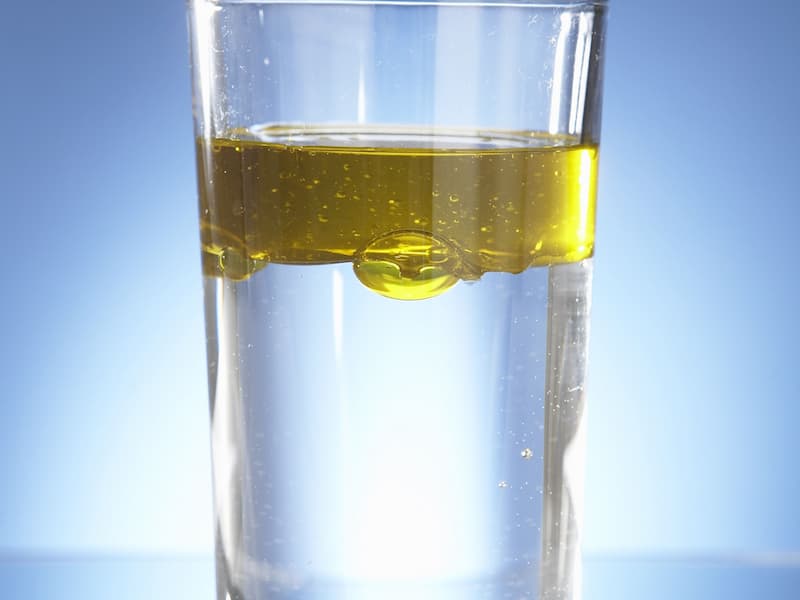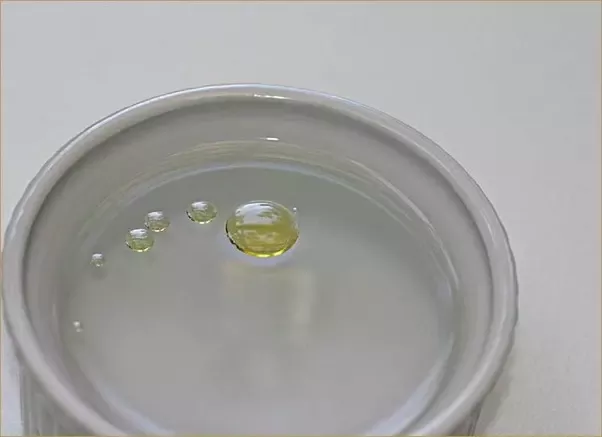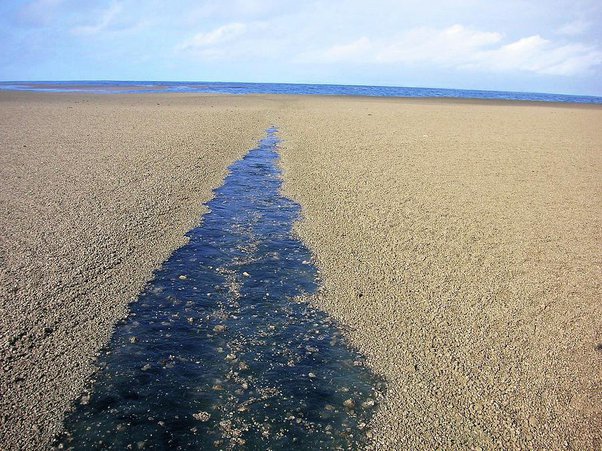
Why Does Oil Float On Water? All You Want To Know
You need soap to clean up an oil spill on the ground because water by itself won’t get the oil out.
The question of why oil floats on water deserves discussion.
Oils float on water as a result of their different densities, which range from 800 to 960 kg/cubic meter for oils and 1000 kg/cubic meter for water, respectively.
Find out more by reading on.
Table of Contents
Why Does Oil Float On Water?
The simplest answer to this question would be that oil floats on the surface of water because it is hydrophobic by nature and less dense than water, so it doesn’t mix or dissolve in it.
It won’t be perfect to explain why oil floats on water to a child using correct science and chemical equations. It ought to be clarified instead. Liquids like oils are hydrophobic by nature, which explains why water and oil don’t mix (hydrophilic is the opposite of hydrophobic). Objects that are hydrophobic remain separate in water and don’t mix. Oil is less dense than water, which helps to explain why it floats on water. Additionally, because they don’t dissolve in water and have a lower density than other substances, they continue to float on the surface. Oil floats on water as a result of its hydrophobic nature.
What Property Of Oil Makes It Float On Water?
Because oil is lighter than water, it floats on it. It would have sunk if the object had more density than water, such as iron. Mass in relation to volume equals density. This means that a cubic centimeter (cc) of oil has a much lower mass than a cubic centimeter of water. Furthermore, the idea of buoyant force can be used to explain it.
Buoyant Force
When oil is submerged in water, the buoyant force is equal to the weight of the water displaced by the oil. When oil is submerged in water, its buoyant force is much greater than its weight. Hence it floats.
Consider dissolving 5 cc of oil in water as an example. 5 cc of water are lost when oil is added to water. When compared to the same volume of oil, that much water weighs significantly more. As a result, the buoyant force outweighs the oil’s weight. Oil thus floats on top of water.
Why Don’t Oil And Water Mix?
The adage “like dissolves like” should be kept in mind when mixing liquids. But oil and water are not the same. Polar molecules make up water. They are drawn to one another by the intermolecular force of hydrogen bonding, which is the bond created when one water molecule’s slightly negative oxygen side attracts another’s slightly positive hydrogen side.
The oil molecules, on the other hand, are non-polar and are less attracted to the water molecules because they are hydrophobic, or afraid of water. Our understanding of it is improved by the idea of the dipole moment.
Dipole Moment
Consider a dipole to be a magnet. It has ends that are positively and negatively charged, similar to the north and south poles of a magnet. The dipole moment, also referred to as the strength of the dipole, is calculated as the difference between the magnitudes of the two charges multiplied by their separation. To mix, the two liquids need to have comparable dipole moments.
Dipoles with similar strengths dissolve faster with one another than those with different strengths. Water and oil don’t dissolve in each other because of the large differences in their dipole moments (like those of hydrocarbon-based oils).
How Did Oil Molecules work With Water Molecules?
Everyone is generally aware of the molecular make-up of water, which is H2O. Consequently, one oxygen atom and two hydrogen atoms have formed a bond. A water molecule is now polar as a result. The molecule has an uneven distribution of charges. It has a partial negative charge thanks to the oxygen atom, but a partial positive charge thanks to the hydrogen atoms. The molecule can form potent hydrogen bonds because of these charges. Many substances, most notably salt, can dissolve in water thanks to this polarity. Salt molecules’ chemical bonds are broken down by the charge, allowing the salt to diffuse into the water.
Oil’s non-polarity is either a problem or, alternately, a benefit. They cannot mix because oil is hydrophobic, which means it fears water in the Greek language. Due to the fact that an oil molecule lacks a charge of its own, there is no attraction between it and the charge in water molecules, so it won’t react to it. The two molecules instead repel one another due to the absence of charge.
If oil were more dense than water, this molecular repulsion would cause the oil to sink to the bottom and create a layer at the ocean’s bottom. However, because it is less dense, it remains on top.
Oil can be cleaned in the wash because of each substance’s unique molecular characteristics. In order to create an emulsion, detergent molecules are made to bind to both water and oil. Although a salad dressing will always be unstable, that is what you aim for whenever you make one. However, a stable version found in foods like mayonnaise combines acids and fats. That’s kind of what happens when you wash your clothes.
The detergent emulsifies the water and oil on your clothes and binds to them. At the conclusion of a wash cycle, it draws the oil into the water and then drains it. Because of this, washing something with just water won’t get it clean, especially if it’s greasy.
Advantages Of Oil
- Detergents are attracted to both oil and water, so this property of oil serves as the foundation for cleaning greasy clothes and dishes. The detergents’ two ends are hydrophilic (or “water loving”) on one side and hydrophobic (or “oil-hating”) on the other. This results in the formation of an emulsion, which is nothing more than a stable mixture of two or more liquids that wouldn’t normally mix together. As a result, the detergent attracts dirt and grime, which the water then removes.
- This property is advantageous to marine life and other aquatic animals. The oil in their feathers and coats protects them from the chilly water in the winter.
- Due to the density difference between salt and freshwater, oil also floats on the surface of salt water. Corn oil, cooking oil, crude oil, etc. are all good testing materials for this behavior.
- Ice will float in oil when submerged in a container. Its less dense nature compared to oil explains this. But as it slowly dissolves into the water, it will sink to the bottom.

Why Does Oil Float On The Water After An Ocean Oil Spill?
Several cases of oceanic oil spills have been reported to us. But why does the liquid always float to the top instead of dissolving, blending, or sinking into the ocean? Ever given it any thought?
Obviously, water and oil don’t mix. Water always floats on top of the oil layer because it is heavier and has a higher density than oil. Actually, the distinction between oil and water molecules is that the former are polar in nature, whereas the latter are non-polar. According to chemical science, non-polar molecules actually repel one another rather than dissolving in polar solvents. Oil and water don’t mix, which is a property that can be attributed.
What Fluid Has A Denser Porosity Than Water?
One of the liquids with a denser consistency than water is glycerol. Polar solvents include water. Mass per unit volume is density. Here, volume and density are inversely correlated, whereas mass and density are directly correlated. As a result, the density increases with increasing mass while decreasing with increasing volume. We can therefore conclude that if two objects have the same volume, the object with a higher mass will also have a higher density.
Despite the fact that glycerol is one of the liquids that is heavier than water, there are many other liquids that are, in contrast to oil. Corn syrup is one of those additional fluids. Since corn syrup weighs more than water, it will inevitably sink if you add it to water. With a density of 450.6 oz/qt (13.5 g/ml) among all of these, mercury is regarded as the heaviest liquid. A heavier object will sink in water, while a lighter object will begin to float. Because oil has a lower density than water, they are incompatible, and oil perpetually floats on the water’s surface.
The Heaviest Liquid Is Water, Right?
No is the obvious response to this query. The heaviest liquid is not water. Science states that there are a number of liquids in the world that are heavier than water. Around 1 g/ml is the density of water. The most absurd aspect of water, however, is that its density varies with temperature, peaking at about 39.2 F (4 C).
Mercury weighs more than water and is the heaviest liquid. There are other liquids as well that are heavier than water. Glycerol and syrups are both known to be heavier than water. You’ll notice that the water in the glass will sink to the bottom if you add any of these to it. Water is heavier than other liquids like alcohol and oil even though it may not be the heaviest liquid. These liquids don’t mix well and float on the top of the container. Water and oil do not mix and do not dissolve in one another. Whether water is the thinnest liquid or not has been documented, but it is undoubtedly thin in nature. On wax, there is a fun fact. In kerosene oil, wax sinks, but on water, it floats! See more about Why Do Bees Have Sticky Hair?
Will An Oil-filled Barrel Float On Water?
Only oil light enough to support the weight of the barrel’s contents as well as the oil itself will cause an oil barrel to float on water. According to Archimedes’ principle, buoyancy is determined by the amount of water that is displaced. An object will float if the mean density (defined as total overall mass divided by gross volume) is lower than water. The mass of the barrel and its contents, multiplied by the gross volume, gives the mean density in this situation. to float its mean density has to be less than 62.4 lb/ft3 or 1000 kg/m3. Because a vapour pocket within the barrel might exist and contribute significantly to overall buoyancy, it is not as simple as it might seem. The barrel will sink much more quickly if it is completely filled with oil. In addition, water type and quality are important. Given that seawater has a higher density than freshwater—roughly 1025 kg/m3—it is more likely to float in salt water. The amount of steel used to create the barrel also has a significant impact. (The density of steel is approximately 7850 kg/m3.)

Why Can’t Water Float On Water?
Water does “float” on water, it is called water stratification.
Water stratification occurs when water masses with different properties, such as salinity (halocline), oxygenation (chemocline), density (pycnocline), and temperature (thermocline), form layers that act as barriers to water mixing, which could result in anoxia or euxinia. The less dense water masses sit above the more dense layers in this normal arrangement, which is based on density.
See more about What Has 4 Letters, Sometimes 9, But Never 5
How Does Vegetable Oil Make The Water Float?
In a mixture of liquids, where each liquid will be depends on the physical parameter Specific Gravity (and surface tension).
Vegetable oil floats on the water’s surface when it is combined with water because it has a lower specific gravity than water. It remains apart from the water because of the high surface tension.
Mercury, on the other hand, weighs a lot more than water and sinks when dropped.
How Would Oil And Water Interact For Water To Float?
Everything is based on density, also known as weight per cubic inch.)
If the oil is lighter than the water, it will float to the top. When oil weighs more than water, it sinks to the bottom.
For instance, if you pour some olive oil and water into a flask, the lighter olive oil will float to the top. Even if you shake the flask to mix the oil and water, all of the oil will eventually float to the top.
The majority of the crude, with the exception of a few lighter components, will sink and collect on the ocean floor if an oil well leaks in deep water and it is heavier than water. Due to its weight, the heavy crude produced by shale oil mines sinks to the bottom of rivers and lakes and kills anything it covers. And when it does reach shore, it does so in the form of globs of oil that resemble putty.
Oil And Water: Does Oil Sink?
The answer to this is almost always no in strictly scientific terms. However, it goes without saying that we must keep in mind rivers, and in particular, the 2010 Kalamazoo River oil spill. Large amounts of diluted bitumen were discharged into the river as a result of an oil pipeline crack. Heavy crude oil from the Canadian oil sands is known as “diluted bitumen.”
The nature of that diluted bitumen was what caused this particular oil spill to be problematic. Even though some of the lighter parts were able to evaporate right away, the remaining, even heavier product ended up sinking to the bottom of the river.
A 35-mile stretch of the river had to be closed off to the public as a result of the spill, and the cleanup process took an incredible five years to finish. To remove all of the bitumen and contaminated soil, the spill’s owner was compelled to dredge the river.
While this type of oil is unlikely to ever be in your possession or to be spilled into the water, it does demonstrate an exception to the generalization that oil will always float. Though uncommon, there are some instances where the density causes it to sink to the bottom of the water.
It’s ironic that ice cubes float in oil instead of the other way around, but this is also because ice has a very different density from water. Bear in mind that icebergs also float on water. Even though there is a sizable density difference, the liquid water produced when the ice melts will exert the same force upward to lift the oil once more.
Oil In Rivers
The fact that an oil spill in a river behaves differently than one in the ocean can be problematic. Even though oil and water molecules don’t actually mix, this doesn’t mean that a temporary mixture can’t be created. If you combine oil and water in a cup at home and stir it with a fork, you can see this. The two liquids will initially mix, albeit unevenly, and oil beads will be visible throughout the water. In essence, this is what happens when oil reaches a river that is moving quickly.
The balance between oil and water is less noticeable in freshwater because it is already less dense than saltwater. The oil will be forced to mix in, at least temporarily, by the rapid churning of a river. Cleaning up an oil spill in a flowing river is practically impossible at that point.
Conclusion
Oils are nonpolar and are not drawn to the polarity of water molecules; as a result, they always float on top of the water because they are less dense than it. … A volume of water molecules weighs more than a volume of oil molecules because oxygen is heavier and smaller than carbon. As a result, water is denser than oil.
Let me know if you have any inquiries.
I appreciate your reading.


